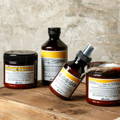Free Carbon Neutral Shipping On Orders $75+, Plus Free Samples!
Buy Now and Pay Later in 4-interest free installments with Klarna
Free Carbon Neutral Shipping On Orders $75+, Plus Free Samples!
Buy Now and Pay Later in 4-interest free installments with Klarna
Rendre la beauté durable
We Are Circular
Ajouter une description, des images et des liens au méga menu
Une colonne sans paramètres peut être utilisée pour créer un espace.
Lien vers vos collections, vos ventes et même des liens externes.
Tried & True Favorites to Protect Your Salon Color
If your hair feels crunchy even after you wash it, it could be damaged. We’re getting to the root of crunchy hair and telling you how to fix it ahead!
The best way to restore softness to your crunchy hair is by focusing on a proper hair care routine. That includes preventive measures like avoiding harmful treatments, and choosing the right products. These are our favorite ways to heal damaged strands and soften crunchy hair.
Using gentle cleansing and conditioning practices with ingredients like coconut oil, hair butters, and herbal treatments can soften hair and restore its health. Some hair types may benefit from a technique called reverse hair washing, which is the process of applying conditioner before shampoo.
Limit heat styling to no more than twice per week and always prime your strands with a heat protectant first. Detangle your hair gently, using your fingers or a wide tooth comb, starting at your ends and working upward. And use protective styles as often as you can.
Protect your hair from the harsh environment, including elements like sunlight, wind, and pollution. Before heading to the beach or pool, lather your strands with SPF just like you do your skin to avoid sun damage. And cover your hair with a hat or scarf, or sit under an umbrella when spending time outdoors.
Getting regular professional trims is an absolute must for the health of your hair. Depending on your hair type, cut, and grow rate, you should trim every four to six weeks for healthy strands. Your stylist will help you determine how often is right for you.
Another non-negotiable in yoursoft, healthy hair journey is eating a balanced diet and drinking lots of water. Eat lots of foods that are known to be healthy for hair and rich in antioxidants, like leafy greens, nuts and seeds, eggs and salmon. And drink at least two liters of water a day.
Crunchy hair, or hair that feels hard, stiff, or crispy is a common struggle in the curly hair community. Managing strands that are dry, rigid, brittle, and lacking smoothness and shine can seem impossible. Not to mention the challenges of stiff hair when it comes to styling. If you’ve been asking yourself ‘why is my hair crunchy?’ We’re here to give you all the answers you seek. Starting with some of the common characteristics of crunchy hair.
Common symptoms include tangling, frizziness, unmanageability, loss of shine, brittle ends, and a distinct audible sound when touched or styled. More on each below.
Tangling: Crunchy hair tangles easily, leading to knots and difficulty in combing.
Lack of Smoothness: Crunchy hair feels rough, uneven and dry and lacks smoothness.
Frizziness: Hair that’s crispy is often accompanied by frizz, making it even harder to manage.
Brittle Ends: The ends of stiff hair strands are dry and brittle, prone to splitting and breakage.
Unmanageability: Crunchy hair makes styling a challenge because it’s stiff to the touch and inflexible, so it doesn’t hold shape.
Loss of Shine: Crispy hair is dull and lackluster, lacking an obvious shine.
Audible Sound: Hair that’s crunchy makes a distinct audible sound when touched or styled
Now that you know how to identify crunchy hair, let’s take a look at some potential causes of the crunch including, hard water damage, over-washing and harsh sulfates and a lack of moisture and hydration. More on each in a minute, but first let’s talk about your hair’s structure. The outer layer of the hair is the cuticle, and it's made up of tiny overlapping scales. Anytime these scales become rough or raised, the strand loses flexibility, becoming rigid and inherently more prone to crunchiness.
If you find yourself asking ‘why is my hair crunchy after I shower?’ you’re likely dealing with hard water buildup on your strands. Hard water contains minerals like calcium and magnesium that build up on your hair, making it difficult for moisture to penetrate. As a result, hair is left dry, stiff and prone to breakage. Hard water buildup on your strands can even lead to hair loss if left untreated. So installing a shower head filter is a great hard water hair treatment. Incorporating a clarifying shampoo weekly is another one.
In addition to damaging hard water buildup, excessively washing and using harsh sulfates can also lead to crunchy hair. Washing too often, even without sulfates (but especially with!), strips your strands of its much needed natural moisture. This not only leads to dry hair and crunchiness, but a dry, irritated or itchy scalp, and even breakage. Stick to gentle, sulfate-free formulas and wash your hair no more than three times a week. Use dry shampoo on your non-wash days to absorb excess oil and buildup at your roots.
Combat the lack of hydration in your strands by overhauling your hair care routine with gentle, moisturizing formulas. Use a mild shampoo and conditioner to help your cuticles lie flat and avoid further moisture loss. Avoid products with alcohol, which can dry your hair out even more, and deep condition regularly. And most importantly, add a nourishing hair oil to the mix, and oil your ends daily.
Still asking yourself ‘why is my hair crunchy when it dries’? Maybe you’re not using the right hair care products. Use only high grade formulas that avoid harsh and damaging ingredients to help soften and improve your hair texture. Davines' range of softening hair products use the highest quality ingredients to nourish and hydrate crunchy hair.
Follow our tips for fixing crunchy hair for good, including staying hydrated and eating right, avoiding heat and using only high grade hair products to hydrate and heal your strands, like the ones from Davines. Our softening formulas are free of harmful toxins and use natural ingredients to restore your hair's health. Not sure where to start? Take our hair quiz to see which products work best for your hair!
by Jaclyn LaBadia, featured contributor
S’abonner pour rester à l’affut des ventes et promotions, les lancements de nouveaux produits et bien plus…
Abonnez-vous à notre newsletter pour bénificier de la livraison gratuite sur votre première commande.
La soumission de ce formulaire confirme que vous acceptez de recevoir les avis de lancement, les promotions et les nouvelles marketing de Davines North America Inc. par courriel.




Laisser un commentaire
Les commentaires sont approuvés avant leur publication.